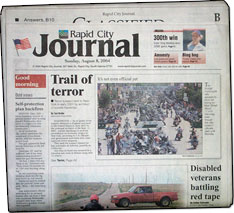In the Headlines
25/02/12 05:05
This language we inherited from the people of England is a really complex method of communicating. People whose native languages are different than English often find our grammar, sentence structure and use of slang to be confusing. When we have had the privilege to host exchange students or other guests from abroad we often find ourselves with an open dictionary trying to explain the nuances of our language. Often we end up laughing at the silliness of it all. No, there are no dogs or parts of dogs in hot dogs. Although the distinction in sound is subtle and very difficult for a native Japanese speaker to hear, we find a big difference between lice and rice.
Then there are the regional variations of our language. To our ears people from New England pronounce bear and beer the same, though we see and hear a big distinction in our version of the language. Down south, my name is said as if it has two syllables: Tay-ed. And when an Australian asks an American if he put the esky in the boot, the American says, “what?” Even when we figure out that we call the boot a trunk, it seems like the wrong place to put a member of the Edmonton Eskimos football team. And Upers (from the upper peninsula of Michigan) think that Esky refers to the city of Escanaba.
 As a reader of newspapers, more and more in their online versions, I have decided that there must be a difference in the language that is used by headline writers and the authors of the articles themselves.
As a reader of newspapers, more and more in their online versions, I have decided that there must be a difference in the language that is used by headline writers and the authors of the articles themselves.
Our local newspaper declares “40th Anniversary Flood Committee to meet next week.” I wonder if we really need a 40th anniversary flood. The original event in 1972 wasn’t all that much fun. Besides any event planned by a committee is bound to be a little strange. I wish we could form a committee to plan a commemoration of the 40th anniversary of the flood that we already had, which comes up this June.
In the same issue of the paper I read that the “South Dakota Senate approves $6M for mountain pine beetle.” These pesky little critters are not in need of additional funding, in my humble opinion. And I oppose the use of any taxpayer monies to fund their destructive activities. Now if the Senate had approved $6M to help mitigate the effects of the beetles . . . O wait, the article and the headline say two different things.
Again in that paper I read “South Dakota lawmakers pass bill on cremation of indigents.” I know that indigent people in our communities can be a problem. We need to find housing and food, job training and other support services. But cremating them seems like a severe punishment. The dictionary defines indigent as “lacking food, clothing, and other necessities of life because of poverty; needy; poor; impoverished.” Once a person has passed away, can they be indigent any more?
 Ah yes, we are capable of using the language to communicate at times, but it can also be a way to communicate meanings that are different from what was intended. Even the venerable New York Times, a newspaper known for having more editors and paying them more than our local newspaper can leave one scratching one’s head after reading the headlines. “Web Deals Cheer Hollywood, Despite Drop in Moviegoers.” It might be more newsworthy had the people who live in Hollywood found cheer rather than their city and perhaps they would be cheered if they would stop dropping moviegoers. If they keep up that kind of nonsense, pretty soon people are going to go to the theatre less often . . . oh wait that’s what the article says.
Ah yes, we are capable of using the language to communicate at times, but it can also be a way to communicate meanings that are different from what was intended. Even the venerable New York Times, a newspaper known for having more editors and paying them more than our local newspaper can leave one scratching one’s head after reading the headlines. “Web Deals Cheer Hollywood, Despite Drop in Moviegoers.” It might be more newsworthy had the people who live in Hollywood found cheer rather than their city and perhaps they would be cheered if they would stop dropping moviegoers. If they keep up that kind of nonsense, pretty soon people are going to go to the theatre less often . . . oh wait that’s what the article says.
What if every newspaper were to require the people who write the headlines to actually read the articles? Hmm . . . that’s probably too much to ask.
The Washington Post recently published “India shuts aid groups over anti-nuclear protests.” If they had only had the space to put the word “down” in the sentence so it would read, “India shuts down aid groups . . .”
 It is not just an east coast phenomenon. The Los Angeles Times ran this headline recently: “A golden spirit stills shines in Randsburg, Calif.” The extra “s” brings to mind the possibility that there may be moonshiners in the golden state. Who knows? Maybe those people who live out in the Mojave Desert need to make their own liquid refreshment from time to time.
It is not just an east coast phenomenon. The Los Angeles Times ran this headline recently: “A golden spirit stills shines in Randsburg, Calif.” The extra “s” brings to mind the possibility that there may be moonshiners in the golden state. Who knows? Maybe those people who live out in the Mojave Desert need to make their own liquid refreshment from time to time.
Do you have to be from Seattle to understand that the headline “Winter Blahs Get the Bluegrass Boot” signals an article about a clogging class? Or is it even safe to assume that readers of the Seattle Times understand what the headline writers were thinking? After all the same issue of the paper had news of the “Afghan Quran Protests.” A literalist might point out that few religious Afghans could be organized to protest the Quran - especially when there are so many people there out protesting the burning of the holy book.
I’m not from Oregon, but I get an interesting mental image trying to picture “Gov. John Kitzhber pushes Oregon lawmakers to move his education bills.” That explains why legislation is such a slow and convoluted process, if you have to shove around a group of people in order to get the paper from one place to another. And as long as I am reading the Oregonian, will “Making Homelessness Visible” help insensitive individuals connect with the people who have no homes?
Here is the good news. You only have to read my rants about the use of language occasionally in this blog – that is assuming you haven’t quit reading and gone on to something more productive by now. My beautiful, talented and extremely tolerant wife has to listen to such complaints every time she is in the same room with a newspaper and me.
And don’t get me started on the ads.
Then there are the regional variations of our language. To our ears people from New England pronounce bear and beer the same, though we see and hear a big distinction in our version of the language. Down south, my name is said as if it has two syllables: Tay-ed. And when an Australian asks an American if he put the esky in the boot, the American says, “what?” Even when we figure out that we call the boot a trunk, it seems like the wrong place to put a member of the Edmonton Eskimos football team. And Upers (from the upper peninsula of Michigan) think that Esky refers to the city of Escanaba.

Our local newspaper declares “40th Anniversary Flood Committee to meet next week.” I wonder if we really need a 40th anniversary flood. The original event in 1972 wasn’t all that much fun. Besides any event planned by a committee is bound to be a little strange. I wish we could form a committee to plan a commemoration of the 40th anniversary of the flood that we already had, which comes up this June.
In the same issue of the paper I read that the “South Dakota Senate approves $6M for mountain pine beetle.” These pesky little critters are not in need of additional funding, in my humble opinion. And I oppose the use of any taxpayer monies to fund their destructive activities. Now if the Senate had approved $6M to help mitigate the effects of the beetles . . . O wait, the article and the headline say two different things.
Again in that paper I read “South Dakota lawmakers pass bill on cremation of indigents.” I know that indigent people in our communities can be a problem. We need to find housing and food, job training and other support services. But cremating them seems like a severe punishment. The dictionary defines indigent as “lacking food, clothing, and other necessities of life because of poverty; needy; poor; impoverished.” Once a person has passed away, can they be indigent any more?

What if every newspaper were to require the people who write the headlines to actually read the articles? Hmm . . . that’s probably too much to ask.
The Washington Post recently published “India shuts aid groups over anti-nuclear protests.” If they had only had the space to put the word “down” in the sentence so it would read, “India shuts down aid groups . . .”

Do you have to be from Seattle to understand that the headline “Winter Blahs Get the Bluegrass Boot” signals an article about a clogging class? Or is it even safe to assume that readers of the Seattle Times understand what the headline writers were thinking? After all the same issue of the paper had news of the “Afghan Quran Protests.” A literalist might point out that few religious Afghans could be organized to protest the Quran - especially when there are so many people there out protesting the burning of the holy book.
I’m not from Oregon, but I get an interesting mental image trying to picture “Gov. John Kitzhber pushes Oregon lawmakers to move his education bills.” That explains why legislation is such a slow and convoluted process, if you have to shove around a group of people in order to get the paper from one place to another. And as long as I am reading the Oregonian, will “Making Homelessness Visible” help insensitive individuals connect with the people who have no homes?
Here is the good news. You only have to read my rants about the use of language occasionally in this blog – that is assuming you haven’t quit reading and gone on to something more productive by now. My beautiful, talented and extremely tolerant wife has to listen to such complaints every time she is in the same room with a newspaper and me.
And don’t get me started on the ads.